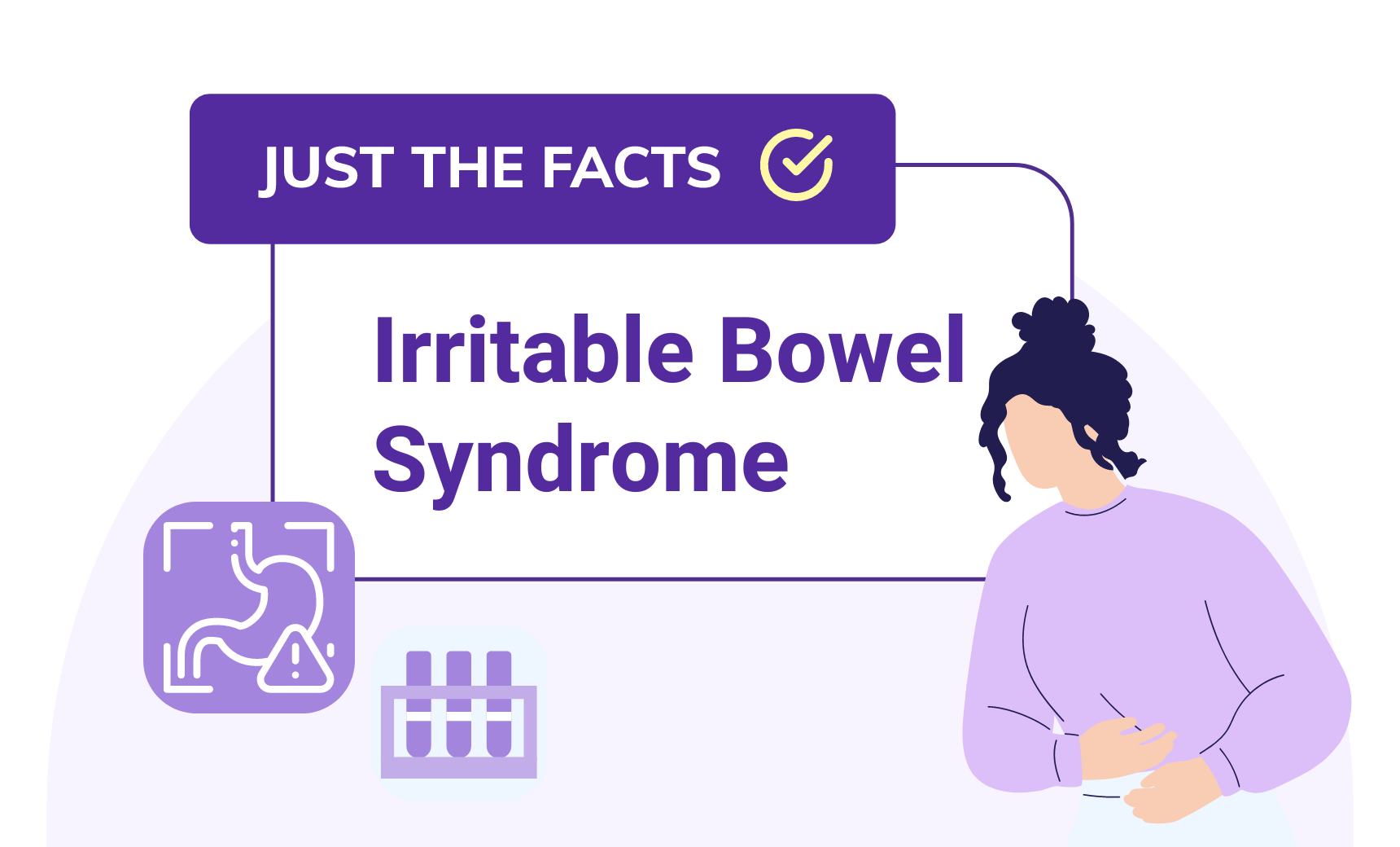
Just the Facts: Irritable Bowel Syndrome
The ultimate guide to understanding and diagnosing IBS, and how to live with it.
IBS can be a real pain in the gut, causing all sorts of discomforts, such as bloating, abdominal pain, constipation, and diarrhea. The good news is that it’s possible to diagnose IBS, effectively manage your symptoms, and improve your daily life with the right knowledge and care.
Here’s what you need to know about IBS.
What exactly is IBS?
From abdominal pain and bloating to constipation and diarrhea, Irritable Bowel Syndrome (IBS) can significantly impact your quality of life in some of the most unpleasant ways, but what is it, exactly?
IBS is a common digestive disorder that affects the large intestine and it can significantly disrupt your day-to-day life. There are three different subtypes: IBS with constipation (IBS-C), IBS with diarrhea (IBS-D), and IBS with mixed bowel habits (IBS-M). Depending on which subtype you have, your symptoms can differ, and the best way to treat them might also vary.
While doctors can diagnose IBS, treating it can be more complicated as there is no cure. The exact cause of IBS is still unknown, but we do know that IBS is related to abnormal contractions of the intestinal muscles. When the muscles in the intestine contract more quickly or slowly than normal, foods move through the digestive system either too quickly or too slowly, leading to a myriad of uncomfortable symptoms.
Understanding Common IBS Triggers
Even without knowing the exact cause of IBS, there are several known triggers that can contribute to its development. One common trigger of IBS is stress. When you’re stressed, your body produces additional hormones that can cause changes in the digestive system. Stress management techniques like deep breathing and yoga can promote relaxation and reduce anxiety.
Changes in gut bacteria can also contribute to IBS. The bacteria in your gut play a vital role in digesting food and regulating the digestive system. If the level of bacteria in your gut is unbalanced, it may result in an IBS flare-up. To promote healthy gut bacteria, try eating foods high in fiber, such as fruits, vegetables, and whole grains.
IBS can also be triggered by diet. For example, food intolerances to dairy, wheat, and gluten may lead to unpleasant IBS symptoms. Keeping a food diary can help narrow down the foods that may trigger your symptoms. To get more specific information regarding food allergies, a FAST test by Infinite Allergy can be taken at home and mailed to their labs for analysis. You’ll be notified when your results are ready. Should your results indicate that you do have a food allergy, let your doctor know so you can both work together to understand how it may be affecting your IBS.
Hormonal changes can also impact IBS. While anyone can develop IBS, women are more likely to develop IBS than men. Hormonal changes during the menstrual cycle can trigger symptoms, and hormonal birth control can also affect symptoms in some women.
Additionally, it’s always possible that IBS is triggered by certain medications, infections, or other digestive disorders.
Symptoms, Diagnosis, and Treatment
Diagnosing IBS accurately is crucial, since other digestive disorders like inflammatory bowel disease or celiac disease can have similar symptoms. However, it’s important to note that the symptoms can vary from person to person, with some experiencing only one or two symptoms, while others may have several.
Doctors usually conduct a comprehensive medical history and physical exam when diagnosing IBS. Additional testing, such as stool samples, blood tests, colonoscopy, and imaging studies, may be done to rule out other potential causes of symptoms. Even though there isn’t a definitive test to diagnose IBS, a thorough evaluation can help healthcare providers diagnose accurately. Many of the tests your doctor may recommend can be scheduled through LabFinder.
Once IBS is diagnosed, healthcare providers may recommend various treatment options to manage symptoms. Doctors may prescribe medications such as antispasmodics, laxatives, and antidiarrheals may be prescribed. Moreover, working with a dietitian to develop an individualized nutrition plan can benefit some individuals with IBS.
Dealing with IBS symptoms can be challenging, but effective management techniques and strategies can help you feel better and offer some relief. If you’re concerned that you might have IBS, talk with your doctor. They can guide you on next steps, and may recommend a test or two to determine what’s causing your symptoms.
If you need to find a testing facility in your area, LabFinder is always here to help.





LabFinder Editorial Team
The LabFinder Editorial Team is behind The Illuminator and The Insider, LabFinder’s consumer and business blogs.
Dr.Robert Segal
Dr. Segal is CEO and co-founder of LabFinder, as well as a board-certified cardiologist. He began practicing medicine in 2002 and has founded several businesses, including Medical Offices of Manhattan and Manhattan Cardiology.